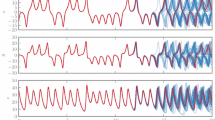Abstract
The Discrete Stochastic Arithmetic DSA is a probabilistic approach for round-off error propagation. After a brief review of the CESTAC (Controle et Estimation Stochastique des Arrondis de Calculs) method, which is the basis of DSA, the concept of the “informatical zero”, also called “computational zero”, is defined. The stochastic order relations of the DSA are presented. The DSA is the joint use of the synchronous implementation of the CESTAC method and the stochastic order relations. After having summarized the asynchronous implementation of the CESTAC method, which has been used in the Prosolver software, and which has been legitimately criticized, the synchronous implementation is presented. Then the CADNA (Control of Accuracy and Debugging for Numerical Application) library which implements the DSA arithmetic is presented. It is shown that this library is able to dynamically control the validity of the hypotheses which must hold so that results provided by CESTAC method are reliable. If the hypotheses do not hold then warnings are printed in a special file. The user is informed that numerical anomalies have been detected. Depending on these warnings the user may conclude either that the results obtained are not reliable and that they cannot be correctly computed with this computer, or he may try to debug his code. It is shown that the numerical examples that support the criticisms and which make the Prosolver software fail, do not jeopardize the CADNA library.
Similar content being viewed by others
References
J.-M. Chesneaux, Modélisation théorique et conditions de validité de la méthode CESTAC, C. R. Acad. Sci. Paris Sér. 1 307 (1988) 417–422.
J.-M. Chesneaux, Study of the computing accuracy by using probabilistic approach, in: Contribution to Computer Arithmetic and Self Validating Numerical Methods (IMACS, New Brunswick, NJ, 1990) pp. 19–30.
J.-M. Chesneaux, CADNA: An ADA tool for round-off errors analysis and for numerical debugging, in: Congres on ADA in Aerospace, Barcelone, 1990, pp. 390–396.
J.-M. Chesneaux, The equality relations in scientific computing, Numer. Algorithms 7 (1994) 129–143.
J.-M. Chesneaux, L'arithmétique Stochastique et le Logiciel CADNA, Habilitation à diriger les recherches, Université Pierre et Marie Curie (1995).
J.-M. Chesneaux et J. Vignes, Sur la robustesse de la méthode CESTAC, C. R. Acad. Sci. Paris Sér. 1 307 (1988) 855–860.
J.-M. Chesneaux and J. Vignes, Les fondements de l'arithmétique stochastique, C. R. Acad. Sci. Paris Sér. 1 315 (1992) 1435–1440.
M. Daumas and J.M. Muller, Qualité des Calculs sur Ordinateur (Masson, Paris, 1997).
W. Kahan, The improbability of probabilistic error analyses for numerical computations, in: UCB Statistics Colloquium, Evans Hall, 1996. PostScript file: http://www.cs.berkeley.edu/wkahan/improber.ps.
D.S. Parker, Monte Carlo arithmetic: Exploiting randomness in floating-point arithmetic, Report of Computer Science Department, UCLA, Los Angeles (30 March 1997).
D.S. Parker, Brad Pierce and P.R. Eggert, Monte Carlo arithmetic: How to gamble with floating point and win, Comput. Sci. Engrg. (2000) 58–68.
M. Pichat, Ingéniérie du Contrôle de la Précision des Calculs sur Ordinateur (Technip, Paris, 1993).
S.G. Popovitch, Prosolver la Commande Electronique, France (Ashton-Tape, USA, 1987).
J. Vignes, Error analysis in computing, in: International Federation for Information Processing Congress, Stockholm, August 1974, pp. 610–614.
J. Vignes, New methods for evaluating the validity of the results of mathematical computations. Math. Comput. Simulation 20 (1978) 227–249.
J. Vignes, Zéro mathématique et zéro informatique, in: La Vie des Sciences, Comptes Rendus de l'Académie de Sciences, Vol. 4 (1987) pp. 1–13.
J. Vignes, A stochastic arithmetic for reliable computation, Math. Comput. Simulation 35 (1993) 233–261.
J. Vignes, A stochastic approach to the analysis of round-off error propagation, A survey of the CESTAC method, in: Proc. of Real Numbers and Computer Conf., Marseille, 1996, pp. 233–251.
Author information
Authors and Affiliations
Rights and permissions
About this article
Cite this article
Vignes, J. Discrete Stochastic Arithmetic for Validating Results of Numerical Software. Numerical Algorithms 37, 377–390 (2004). https://doi.org/10.1023/B:NUMA.0000049483.75679.ce
Issue Date:
DOI: https://doi.org/10.1023/B:NUMA.0000049483.75679.ce




